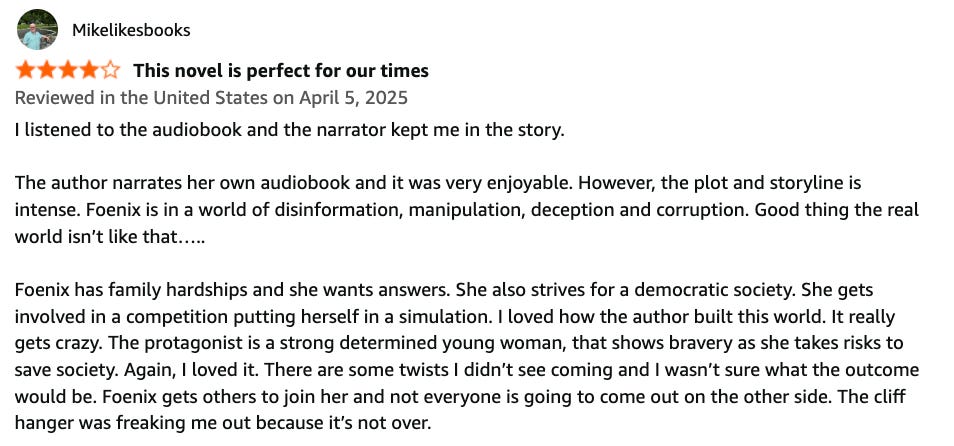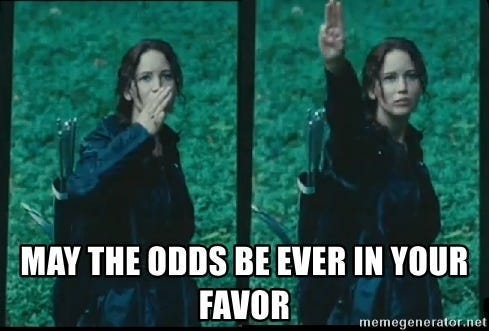Learning From My Product Marketing Mistakes
Whether it’s a book, a newsletter, a journalistic article, or a new piece of technology—it’s still a product.
Finding balance has never been my strong suit. I’m usually either all the way in or all the way out. Lately, I’ve needed to step out. In a sense, I’ve given myself permission to step out—and by “out” I mean away from real headlines and problems in the world around me, and into the world of fiction I created with my book. And boy, am I thankful for this mental reprieve. But this decision hasn’t been easy.
My industry is the information sector—whether I’m reporting a news story, working as a diplomat (literally titled “information officer”), or consulting—knowledge is my currency. So choosing to step away, even for a minute, feels risky. But this step has been healing, and I’ve learned a few gems about the fiction world that I want to share.
Books Also Require a Journey of Product-Market Fit
While working on JAM CQ (the startup I’ll dive deeper into in another post), I had been on a journey seeking product-market fit: finding customers whose pain your product helps enough for them to pay for it. Oftentimes, the best approach is to find the pain point first and design around it—usually something you, as the founder, personally experience—then find others who share that “pain” and want your solution.
Books are similar: you are not all things to all people. You’re designing for a specific audience—someone who feels your pain and wants to escape in your book as a solution. Then you look for the hundreds of others who feel the same, who can relate to that pain and want your solution. They become your primary audience.
My pain at the time of writing The Herd?
It was 2018 when I started. I was disillusioned with the direction of the media industry. Six years ago, I saw the inevitable crash of information distrust that we’re experiencing on a very real level today. I wanted to talk about it. I also wanted more smart Black females saving the world. I wanted something for people who loved young adult dystopias but were ready for something a bit more grown-up. Those were my pain points, and The Herd: When Democracy Falls was my solution.
And I see how the readers who share this pain give me the reviews and references I’m looking for.
But it is a journey to find this core audience. Maybe that’s why people look for founders who deeply love their products—and authors who deeply love their books—because they will go on the journey of finding their audience, of building that coalition of people who back what they have.
Reviews Build Momentum
One mistake I initially made was testing my product—both the book and the startup—with literary agents and VCs rather than customers first. I realize now that their goals are different from my own. Agents and VCs are investors, looking for products that maximize returns for a large audience, often in the multimillion- or billion-dollar range. But as a producer and builder, that’s not necessarily what I’m looking for. By turning my attention back to what I could build sustainably, I found more happiness and more approval—the motivation I needed to continue on my product-market fit journey.
I’ve sought out customers—readers—one by one, and watched as their reviews validate my product’s quality. When my conversations with agents seemed to hit walls, friends and strangers around the world dived into my fiction world and came out fans of Feonix (my main character). That gave me the confidence I needed, at just the right time, to start drafting Book Two and keep going on my product-market fit journey.
Being Okay With the Mistakes
Every time I dive into something new, I spend hours learning about the industry, and that comes with mistakes. I guess that’s why it’s not ideal to make a lot of career changes in life—we only have so many years to live, even if you consider yourself a multi-hyphenate like me. You inevitably spend a considerable amount of time learning, and doing some things wrong.
In the past, I’ve been crippled by perfectionism. I would read sentences over and over again. I would agonize if I had to correct something I published. I would feel stung if I got a review that was less than five stars. It’s an impossible way to live, I know. And so, I’ve grown more comfortable saying, “I’m learning.”
I recently ran an A/B test on my book cover and saw that my current one performed half as well as other options. I probably should have done that before, but I’m okay with saying I’m learning and fixing it now. That ability to be okay with the learning process—and with being human—has been its own journey.
As you go through your week, I hope some of these lessons help you.
Subscribe and Share
I hope you found this newsletter helpful and engaging please share with any friends or family you think would be interested and feel free to buy me a coffee by subscribing if you got some use out of it.
Follow me on Instagram too!
And here is my LinkedIn.









